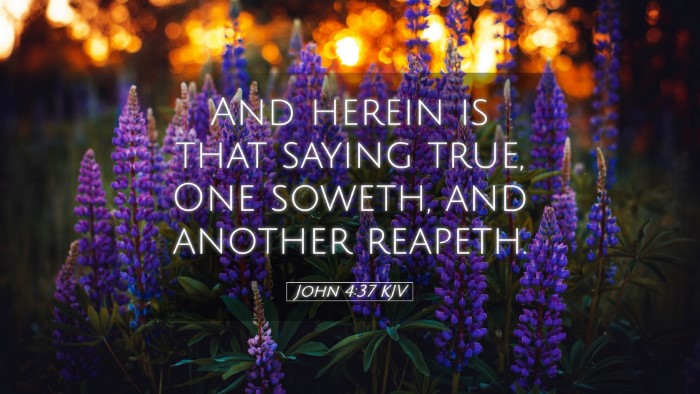Interpretation and Insights
In exploring John 4:37, we glean various layers of meaning from public domain commentaries. This verse emphasizes the cooperative nature of ministry; the act of sowing the seed of God's word and the subsequent reaping of souls aren't limited to one individual but reflect a broader engagement in God's work.
Matthew Henry's Commentary
Matthew Henry highlights that the statement made by Jesus is a reflection on the disciples' role. He notes that sowing and reaping are natural processes, and in this spiritual application, it signifies the interconnectedness of the laborers in God’s field.
- Sowing and Reaping: Henry points out that the work of sowing the Gospel may not always lead to an immediate harvest. It requires patience and faith from those participating.
- Encouragement for Workers: He encourages believers to accept the reality of their contribution, whether they are in the sowing phase or reaping fruits of labor previously exhibited by others.
Albert Barnes' Notes
Albert Barnes reinforces the critical concept of communal work in the Kingdom of God. He writes that the statement by Jesus indicates the reality that many have a role in spiritual harvests.
- Division of Labor: Barnes emphasizes the idea that some may preach the Gospel, while others may bring souls to Christ—this synchrony is vital for growth.
- God's Sovereignty: He also discusses that God oversees the entire process of sowing and reaping, ensuring that all efforts have eternal significance.
Adam Clarke's Commentary
Adam Clarke provides additional clarity by bringing an applicative perspective for believers today. He emphasizes the necessity of understanding our part in both the evangelistic process and the acknowledgment of those who have paved the way.
- Investing in the Future: Clarke argues that the investment made by one generation in sharing the Gospel is often reaped by another, emphasizing the long-term nature of spiritual investment.
- Recognition of Contributions: He stresses the importance of recognizing those who have sown seeds in our own lives and encourages gratitude for their faithfulness.
Theological Themes
This verse brings forward several theological themes pertinent to pastors, students, theologians, and scholars:
- Cooperation in Ministry: The text invites a deeper understanding of collaborative ministry, urging reflection on how every believer contributes to the body of Christ.
- Divine Timing: The principle of sowing may require long periods of waiting before fruit is seen, challenging the often immediate satisfaction sought in modern contexts.
- Legacy and Continuation: The aspect of legacy in ministry is critical, encouraging believers to consider their impact on future generations.
Practical Applications
For pastors and students of the Word, the following applications can be derived from this commentary:
- Encourage Patient Ministry: Promote a culture where congregations embrace both the sowing and reaping phases in expectation of God's timing.
- Recognize Others' Contributions: Leaders should consistently encourage recognition of spiritual mentors and predecessors who have significantly contributed to the faith journey.
- Be Faithful in Your Role: Encourage individuals to identify and commit to their roles within the body of Christ, whether they are sowers or reapers.
Conclusion
In John 4:37, Jesus articulates a principle that transcends time and context, reminding all believers of the divine orchestration involved in harvesting souls for the Kingdom. Whether we find ourselves as sowers or reapers, the call remains the same: to faithfully engage in God's work as part of a larger community of faith.


